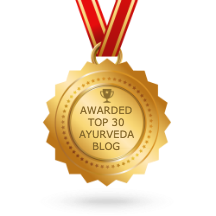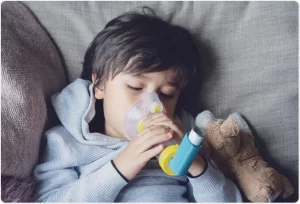
Table of Contents
ToggleAllergic Rhinitis medication : An Ayurvedic Perspective
Introduction :
In this article, we will discuss medication for allergic rhinitis in Ayurveda. Many patients suffer from this immune-related respiratory condition, which commonly presents with symptoms such as sneezing, runny nose, and nasal congestion.
The condition is primarily triggered by environmental allergens such as dust, mold spores, dust mites, pet dander, and pollen. Seasonal changes, temperature fluctuations, and even pre-existing viral or bacterial infections can further contribute to the onset or worsening of allergic rhinitis.
Globally, allergic rhinitis is recognized as one of the most common chronic respiratory disorders, affecting people of all ages. While conventional medications may provide temporary relief, Ayurvedic treatments focus on addressing the root cause, strengthening immunity, and providing long-lasting relief from recurring symptoms.
Understanding Allergic Rhinitis in Ayurveda :
- What is Allergic Rhinitis in Ayurveda?
- Kapha Dosha: Representing the elements of water and earth, its imbalance leads to increased mucus production and congestion.
- Vata Dosha: Representing air and space, its imbalance causes dryness and irritation in the nasal passages.
Ayurveda’s Take on Allergic Rhinitis :
- Classification in Ayurveda: Pratishyaya Roga.
- Key Treatment Focus:
- Balancing the three doshas in the body.
- Cleaning the sinuses and eliminating accumulated mucus.
- Detoxification to restore dosha balance.
- Therapies like nasal drop treatment and Panchakarma.
Symptoms of Allergic Rhinitis :
- Kapha Imbalance: Nasal congestion, excessive mucus, heaviness in the head.
- Vata Imbalance: Dryness, irritation, sneezing.
Causes and Risk Factors :
Causes
- Allergic rhinitis is caused by an exaggerated immune response to allergens. Upon exposure, the immune system releases histamines and other chemicals, causing inflammation and symptoms.
Risk Factors
- Family History: Genetic predisposition to allergies.
- Environmental Factors: High exposure to allergens, pollution, and irritants.
- Age: Allergies often manifest in childhood or adolescence.
- Other Allergies or Asthma: Increased risk for individuals with other allergic conditions.
Types of Allergic Rhinitis :
- Seasonal Allergic Rhinitis: Triggered by pollen from trees, grasses, and weeds.
- Perennial Allergic Rhinitis: it usually Occurs yearly -round due to indoor allergens like dust mites, pet .
Common Symptoms :
- Sneezing
- Itchy or runny nose
- Nasal congestion
- Itchy or watery eyes
- Postnasal drip
- Fatigue
Diagnosis :
Medical History and Symptoms :
- A healthcare provider will evaluate your medical history and symptoms.
- Questions may be asked regarding exposure to specific allergens.
Allergy Testing :
- Skin Prick Test: Small amounts of allergens are introduced into the skin to observe reactions.
- Blood Tests: Measure the presence of specific IgE antibodies.
Ayurvedic medication for Allergic Rhinitis :
Ayurvedic treatment is personalized based on the patient’s body type. It addresses the accumulation of toxins (ama), low immunity, and hypersensitivity of the nervous system. The treatment plan focuses on balancing the tridoshas and strengthening the immune system to prevent overreaction to allergens.
Herbal Remedies :
- Turmeric (Curcuma longa): Anti-inflammatory properties; can be consumed in warm milk or as a supplement.
- Ginger (Zingiber officinale): Reduces inflammation; fresh ginger tea is beneficial.
- Tulsi (Holy Basil): Immune booster; can be consumed as tea or chewed fresh.
Nasal Irrigation :
- Neti Pot: Saline solution rinses nasal passages, clearing allergens and mucus.
Dietary Adjustments :
- Include anti-inflammatory foods like fruits, vegetables, and whole grains.
- Avoid heavy, processed, oily, spicy, and sour foods.
Lifestyle Changes :
- follow Regular exercise to boost immunity and overall health is needed.
- Need Stress management techniques such as yoga or meditation must be adopted .
Panchakarma
- Detoxification therapies like Vamana, Virechana, and Nasya will help manage symptoms and improve overall health in all patients .
Ayurvedic Formulations
- Specific formulations like Chyawanprash or Sitopaladi Churna may be recommended by an Ayurvedic practitioner.
Why Choose Ayurveda and Panchakarma for Allergic Rhinitis Treatment?
- Ayurveda provides an holistic and natural approach that addresses the root cause of allergic rhinitis permently rather than merely alleviating symptoms by other pathy.
- Panchakarma therapies aid in detoxifying the our body and restoring balance, offering long-term relief and improved quality of life.
Tags
#allergic rhinitis #allergic rhinitis ayurveda treatment #allergic rhinitis treatment #allergy treatment #allergy #ayurvedic clinic in Pune #ayurvedic clinic in Kharadi #ayurvedic doctor in Kharadi





